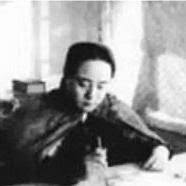P'u-ju (1896-18 November 1963), painter, calligrapher, and poet.
Born in the town of Wanp'ing, near Peking, P'u-ju was the second son of Tsai-jung, a brother of Tsai-feng (Prince Ch'un). Thus he and his two brothers, P'u-wei and P'u-hui, were cousins of P'u-yi (q.v.), the last Manchu emperor. After receiving a traditional education in Peking, P'u-ju went to Germany about 1914 and enrolled at the University of Berlin. He returned from Europe about 1917 with a Ph.D. in astronomy and a bit more pride in his accomplishment than his mother thought proper. He soon discovered that astronomers were not in demand in China. At his mother's behest, he retired to the Buddhist temple Chieh-t'ai-ssu in the Western Hills near Peking. He remained apart from the world for several years, filling his days with poetry and painting. During this time he referred to himself as the Hsi-shan i-shih [retired scholar of the Western Hills].
In 1926 P'u-ju exhibited some of his paintings at Peking and established a fine reputation as a painter. Because he was a traditionalist, he held that the writing of poetry, painting, and calligraphy should be developed equally. P'u-ju was an ardent student of poetry and an accomplished calligrapher, following the chuan-li style of Yen Liu until he became a master calligrapher in his own right. P'u-ju's other interests included chess, music, and good food. Because of his extravagance, improvidence, and impracticality, his inheritance gradually melted away. To maintain his standard of living, he taught painting at Peking Normal University and at the Peking Institute of Fine Arts. He also accepted private pupils.
P'u-ju reportedly remained in Peiping throughout the Sino-Japanese war. In 1947 he abandoned his apolitical role to the extent of accepting election to the National Assembly as a Manchu delegate. Later in 1947 he left Peiping and went to Hangchow, where he resided with a friend. He made preparations for a trip to the sacred mountains of China, but had to abandon his plans because of the Kuomintang-Communist struggle for control of the mainland. In May 1949 Mao Tse-tung reportedly invited P'u-ju to return to Peiping. P'u-ju responded by boarding a ship and sailing to the Chusan Islands, then still in Nationalist hands.
In 1950 P'u-ju went to Taiwan, where he supported himself by teaching at Taiwan Normal University and by selling his paintings and examples of his calligraphy. He also became a director of the China Spinning Construction Company. In Taiwan, as on the mainland, he wore the traditional long gown of the Confucian scholar, insisted that his students pay him proper Confucian deference (including ritual prostration), and smoked cigarettes constantly. In March 1963 P'u-ju underwent a medical examination and learned that he had cancer of the throat. Because he had little faith in Western medicine he refused to undergo an operation. He consulted various practitioners of native medicine, but to no avail. P'u-ju died on 18 November 1963. He was survived by his wife, Li Mo-yun, and by their two sons. Hsiao-hua and Yü-ch'i.
The publication of P'u-ju's Han-yu-t'ang Lun-chi [collected essays] in 1963 was subsidized by the ministry of education in Taiwan. Just before his death, he published the two-volume collection Hua-lin Yun-yeh. After his death, the National Museum of History in Taiwan set up a permanent exhibition of his paintings and his painter's tools.

溥儒
号:心畬
溥儒(1896—1963.11.18),画家、书法家、诗人。
溥儒出生在北京附近的宛平,是醇亲王载沣的兄弟载洵的第二个儿子。他和兄弟溥伟、溥恵是清朝末代皇帝溥仪的堂兄弟。他在北京受旧式教育后,于1914年去德国进了柏林大学,1917年获得天文学博士学位回国,同时带回了被他的母亲认为不适当的对自己成就的骄傲感。不久他发现天文学在中国没有出路,奉母命退隐北京西山戒台寺,离群索居了几年,终日吟诗作画,自号西山逸士。
1926年,他在北京展出绘画,树立了作为一个画家的名声。他是笃信传统的人,认为诗词、节、画应该并重。他勤奋地学习作诗,擅长书法,师承颜真卿、柳公权而自成一家。此外,他又爱好琴棋和精美食物,由于挥霍无度,不会营生,不谙事务,他的遗产逐渐用尽。为谋生计,他在北京师范大学、北京美术学院教画,还接受私人学生。
中日战争期间,溥儒留居北平。1947年,他不再厌弃政治,当选为出席国民大会的满族代表。年底去杭州,卜居朋友家中,准备遍游国内名山,但因发生国共争夺大陆战争未能成行。1949年5月,据说毛泽东曾请他来北平,溥儒登船去了仍在国民党手中的舟山群岛。
1950年,溥儒去台湾,在台湾师范大学以教书并出售书画谋生,后来又成了中国纺织公司经理。他在台湾,仍穿着传统的儒家门徒的长袍,要学生行儒家的尊师之礼(包括跪拜)。他抽烟抽得很凶。1963年3月,溥儒经医生检查患有咽喉癌,但他不信西医,不愿做手术。他经中医多方治疗无效,于1963年11月18日死去。遗有妻李慕容(译音)和两个儿子:小华、毓琪(译音)。
1963年,台湾教育部资助出版了溥儒的《寒玉堂论集》。他在死前自行出版了两卷《画林云叶》。死后,台湾历史博物馆为他设立了陈列馆,陈列他的绘画和作画工具。